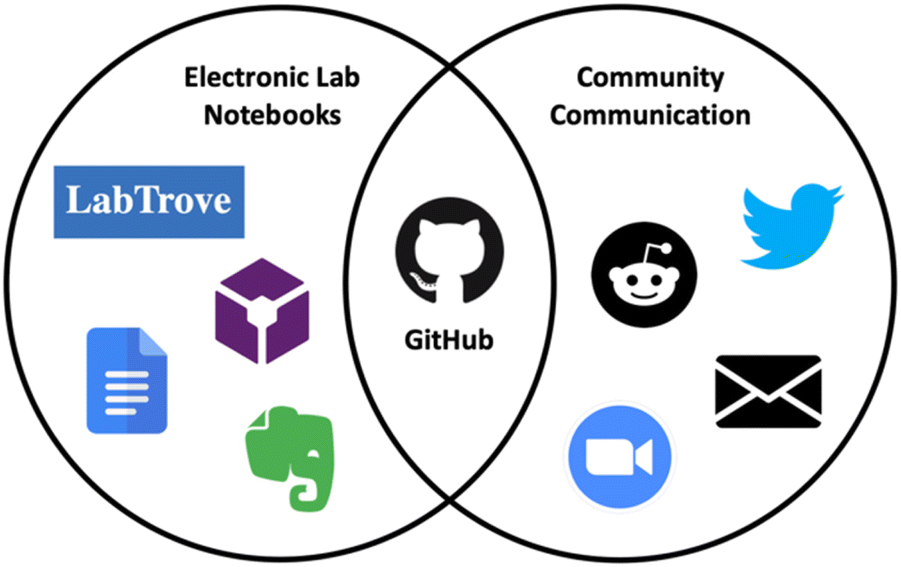Journal:GitHub as an open electronic laboratory notebook for real-time sharing of knowledge and collaboration
| Full article title | GitHub as an open electronic laboratory notebook for real-time sharing of knowledge and collaboration |
|---|---|
| Journal | Digital Discovery |
| Author(s) | Scroggie, Kymberley R.; Burell-Sander, Klementine J.; Rutledge, Peter J.; Motion, Alice |
| Author affiliation(s) | University of Sydney |
| Primary contact | Email: alice dot motion at sydney dot edu dot au |
| Year published | 2023 |
| Volume and issue | 2 |
| Page(s) | 1188-1196 |
| DOI | 10.1039/D3DD00032J |
| ISSN | 2635-098X |
| Distribution license | Creative Commons Attribution-NonCommercial 3.0 Unported |
| Website | https://pubs.rsc.org/en/content/articlehtml/2023/dd/d3dd00032j |
| Download | https://pubs.rsc.org/en/content/articlepdf/2023/dd/d3dd00032j (PDF) |
|
|
This article should be considered a work in progress and incomplete. Consider this article incomplete until this notice is removed. |
Abstract
Electronic laboratory notebooks (ELNs) have expanded the utility of the paper laboratory notebook beyond that of a simple record keeping tool. Open ELNs offer additional benefits to the scientific community, including increased transparency, reproducibility, and integrity. A key element underpinning these benefits is facile and expedient knowledge sharing which aids communication and collaboration. In previous projects, we have used LabTrove and LabArchives as open ELNs, in partnership with GitHub (an open-source web-based platform originally developed for collaborative coding) for communication and discussion. Here we present our personal experiences using GitHub as the central platform for many aspects of the scientific process, including version-controlled recording of experiments, results and interpretation, data storage, project management, workflows, communication, and collaboration. We report on the utility of GitHub as an open ELN for chemistry research, and we discuss our experiences employing it with the Open Source Mycetoma and Open Source Tuberculosis consortia. By outlining its features and shortcomings through their implementation in our work, we demonstrate how using GitHub as a central platform can aid the real-time sharing of knowledge and collaboration, and further democratize scientific research within both open and traditional research models.
Keywords: electronic laboratory notebook, ELN, GitHub, data sharing, knowledge sharing, chemistry, open research
Introduction
Technological advances have allowed scientists to move beyond the primitive utility of the paper laboratory notebook as a record-keeping tool. In 1994, Borman noted that electronic laboratory notebooks (ELNs) “could revolutionize how scientists record their research, manage their data, and share their information with others.” [1] ELNs have indeed been integrated into laboratory information management systems (LIMS) and electronic laboratory environments (ELEs), but they have also revolutionized the way in which scientists disseminate knowledge, particularly through the internet.
ELNs enable knowledge sharing, facilitating faster transfer of knowledge and collaboration, which in turn expedites future knowledge generation and improves research efficiency. [2,3] The digital storage of information further increases efficiency with greater longevity, readability, and searchability. Despite these benefits, the shift away from paper to electronic has been an evolutionary process rather than a revolutionary one, and scientists—particularly those in academia—have been slow to accept and adopt ELNs. [4]
The ability of scientists to move to electronic documentation of their work with minimal disruption has been identified as the key factor for broader acceptance of ELNs in an academic setting. [5] However, the highly diverse nature of different disciplines within academia leads to a broad range of specific needs that require highly specialized or custom ELNs to affect a seamless transition. While some commercial ELNs can support many specialized requirements, their licensing and maintenance costs often put them out of reach for individual academic research groups. [6,7] Instead, many have made use of generic, freely available platforms such as OneNote [8], EverNote [9,10], or Google Docs [11], with others developing their own ELNs to reap the specific benefits they require. [12–14]
We at the University of Sydney have successfully used several different ELNs for our own work as part of different open-source drug discovery consortia, including Open Source Malaria [15], Open Source Mycetoma [16], and Open Source Tuberculosis. Open-source drug discovery is a new approach to drug discovery in which all aspects of research are shared publicly and in real-time (i.e., immediately as it is produced) to facilitate collaboration and knowledge sharing. [17] These consortia follow the principles of open science, in which scientific knowledge is developed collaboratively and made freely accessible to any interested parties [18], and more specifically Todd's Six Laws of Open Science.[19]
In line with openly sharing our research, we have hosted ELNs on the open-source software platform LabTrove [20] and the commercial ELN LabArchives,) while simultaneously using GitHub to support discussion and collaboration. To bring together the sharing of knowledge and collaboration into a single open and central location, we have now explored the use of GitHub itself as the ELN (Fig. 1). Using GitHub as both an ELN and a hub for instant communication elevates it to the status of a “collaboratory” as envisioned by Wulf, as a “centre without walls, in which the nation's researchers can perform their research without regard to geographical location, interacting with colleagues, accessing instrumentation, sharing data and computational resource, and accessing information in digital libraries.”. [21]
This article draws on the experiences of two of the authors using GitHub as an ELN for various synthetic chemistry projects and provides preliminary findings into its usability. We report on the utility of GitHub as an open ELN, detail its features in this dimension, and discuss its implementation for open-source drug discovery. We also share an ELN template GitHub repository for those considering alternative ELNs. While we have used GitHub as an open ELN, and repositories are open by default, we note that for projects that require confidentiality or follow a traditional research methodology, information and data can be held within closed repositories with access limited to only invited users.
|
GitHub
References
Notes
This presentation is faithful to the original, with only a few minor changes to presentation. In some cases important information was missing from the references, and that information was added.










